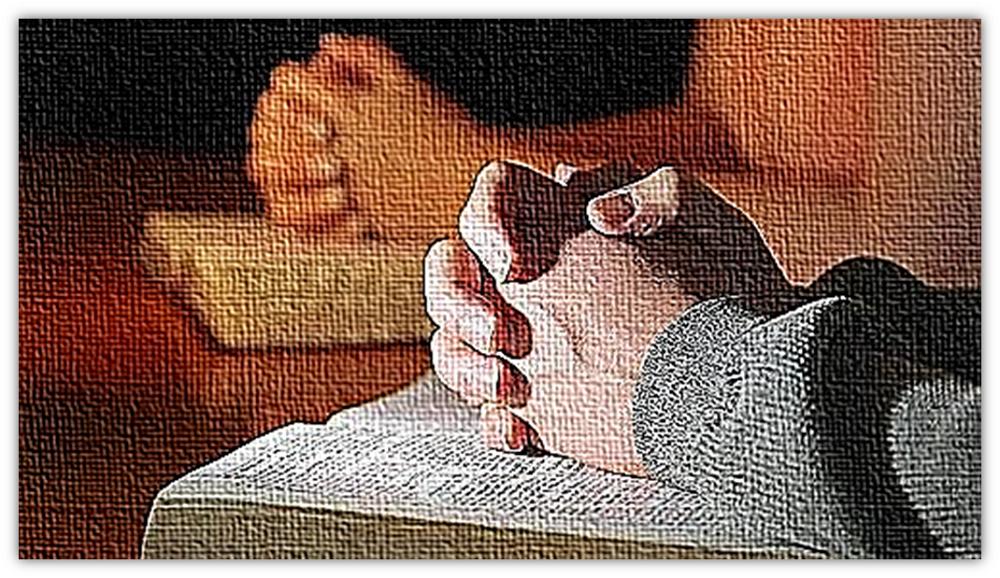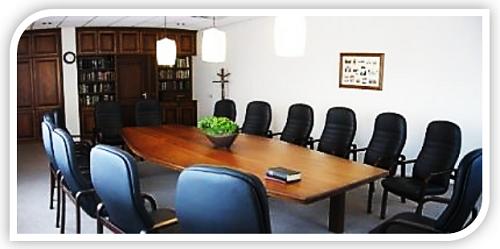Praying in the Consistory Room? The prayer of elders before the worship service
Praying in the Consistory Room? The prayer of elders before the worship service

In many a church it is customary for the duty elder to utter a prayer in the consistory room before accompanying the minister to the pulpit. It concerns here a most honourable tradition upheld in many churches since time immemorial. But as much as we know of the beginnings of Reformed liturgy, the same cannot be said of the origins of this tradition.
H. Bouwman, one-time professor at the Theological College in Kampen, the Netherlands, observes the following concerning the origin of this custom: “This prayer most likely stems from the time of the Secession, when believers, afflicted by severe persecution, could never be certain that their gatherings would not be disrupted by the military or police, and that therefore the church council and minister felt the need to unite in prayer even before the church service would commence. This custom became commonplace in the churches of the Secession and was later adopted by the churches of the Doleantie.”
There are no anecdotal accounts from earlier centuries testifying to the existence of this prayer. A certain degree of uncertainty remains. Bouwman writes “most likely,” and unfortunately that is how it remains until today.
Following the Liberation, many of our churches broke with the tradition. In many instances this went hand in hand with the discontinuance of the “silent prayer” by the congregation at large at the commencement of the church service. The opinion that a blessing upon the service ought to be prayed for in the homes prevailed. When in the '70s a renewed interest in liturgical matters arose, many a church reintroduced the consistory prayer. The practice of today is that one of the elders leads in prayer before the commencement of the morning service and again after the conclusion of the afternoon service.
Official Labour⤒🔗
So how are we to view this? What is the character and what is the sense of these prayers? Joh. Jansen in his well-known commentary on the Church Order says that the consistory prayer is by no means official (i.e., belonging to the office), but is merely private in character. “Like a member of the congregation will prior to the service seek God’s blessing for himself, so one of the brothers of the church council will implore God to be with the minister of the Word.” Now it seems to me that Jansen completely misses the mark. This most certainly is official labour. The brother leading in prayer does so in his capacity as elder. The church council calls the congregation together. Likewise it is the church council, which by the mouth of one of its office-bearers seeks the Lord’s blessing upon the church service to be held. The very fact that an elder leads in prayer flows from the office of elders. It is they who have been entrusted with the rule over the church and the supervision over its teaching. Therefore, it is also logical that the duty elder is the one to offer this prayer, for it is also he, who on behalf of the council extends the hand to the officiating office-bearer to symbolise that he does not act of his own accord, but is duly authorised by the church council.
It is true that prayers will already have been sent up in the homes and that in the service itself God will also be implored for His blessing, for the listening ear of the congregation and for strength for the minister of the Word. This, however, in my opinion does not negate the fact that it is fitting for a church council, which convenes the church service and carries responsibility for it, to pray for God’s help and blessing. This seeking of God’s face together, before the service, at the same time makes it abundantly clear that the minister does not do his work alone, be it under instruction from the church council, but that he acts in harmony with his fellow office-bearers. It is a wonderful expression of the characteristically Reformed view of the office: collegiality, together as one before the congregation. In a Reformed church an office-bearer is always office-bearer together with the other office-bearers. Reformed church polity knows of no solo performances.
Supplication←⤒🔗
As far as the content goes, it will most certainly have to be a prayer of supplication and intercession for the servant who is to officiate in prayer and preaching. It is not a small thing to proclaim God’s message to His people and to be the spokesman for the congregation. If even the apostle Paul covets the prayers of the saints so that “utterance may be given to me, that I may open my mouth boldly to make known the mystery of the gospel” (Eph. 6:19), how much more fitting is this prayer then for the minister who is about to go and do his responsible work in the church service!

The prayer of the consistory will however also need to be a prayer for the congregation, called together by the church council. It is not a foregone conclusion that she indeed will heed the message from God. The seed of the Word needs to fall upon “fertile soil” (Matt. 13:8). It must be heard and understood (Matt. 13:23). This too must be included in the prayer in the consistory room.
Lastly, it is right that there is attention also for all those who have a task in serving. I have noticed that elders are rarely prayed for, while it is they who have oversight over the preaching. It is, in my opinion, most fitting that the prayer in the consistory room also asks for these superintendents to watch over the sound doctrine (Titus 2:1, 8).
It is of utmost importance that the elder is aware that this is no private prayer, but a prayer of supplication and intercession before God, intercession, which by nature of its function has limitations. It must focus solely on the church service about to be held. The various needs and trials current in the congregation have no place in this prayer. Neither must the brothers pray for a blessing for themselves. This is to be a prayer of supplication and intercession specifically focused on what is about to happen.
Thanksgiving←⤒🔗
In those churches where it is customary to pray before the morning service, it is also common practice, after the second service, to offer a prayer of thanksgiving in the consistory room. Permit this prayer then really to be a prayer of thanks for what the Lord gave in the services, both to the one officiating and to the congregation. It is a beautiful thing when the elder is able to refer back to the message proclaimed, at the same time watching out not to make a show of how well he himself has payed attention. Actually, thanksgiving need not wait until after the second service. Thankful prayer may rise already in the morning: did not Paul admonish us to make our requests known to God by prayer and supplication with thanksgiving (Phil. 4:6)?
Praying is a sensitive and holy work. The elder who is to lead in prayer ought to prepare at home. At times I do hear impoverished prayers in the consistory room, almost as though there’s hardly been any preparation of what to pray for.
I consider it appropriate that upon the ordination of new office-bearers, the consistory prayer is placed on the agenda for the next following consistory meeting. Never in my lifetime have I experienced that this matter is brought up for discussion, which to me seems an omission. The prayer before and after the church services is part of the official work of the elder.
Encouraging←⤒🔗
Allow me to finish on a personal note. I myself experience the consistory prayer as valuable encouragement. They’re praying for you before you ascend the pulpit! You’re not doing this in your own strength, but here is a prayer that certainly will be answered by the Lord. You’re surrounded by praying brothers. I believe many of my colleagues will feel the same way. In a time where ministers do not have an easy time of it, there is much comfort to be had when a minister of the Word knows himself carried by the prayers of his fellow brother office-bearers.

Add new comment